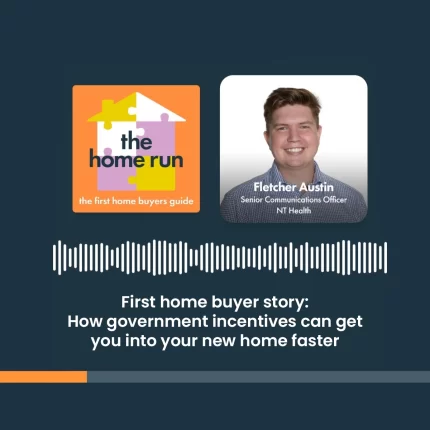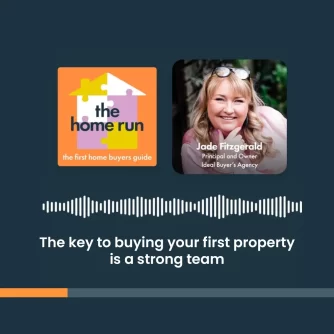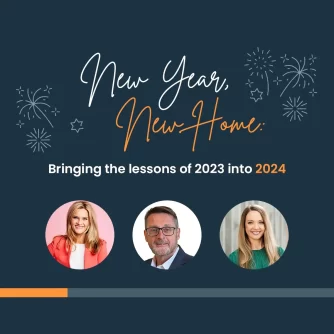Episode Outline
Show Notes
Fletcher Austin is a first-time home buyer. Not long ago, Fletcher was in the same position as you: preparing to buy his first home. In late 2020, he purchased a block of land in Darwin, NT and built his house.
In this episode, Fletcher will explain why he chose to build his own home instead of buying a pre-existing home and the benefits of that choice. He’ll also get into the best reasons to live in a regional area and how he used timely government incentives to speed up his timeline.
Speaker:
Renee Young (Senior Consultant Education Recruitment)
Transcript
Michael 0:00
The information contained in this podcast is general in nature and is not to be taken as financial or personal advice.
Michael 0:06
It does not consider your objectives, financial situation or needs.
Michael 0:10
You should consider whether this information is suitable for you and your personal circumstances before acting on it.
Michael 0:16
Hi and welcome to the home, run your guide to buying your first home in Australia on the show, I’ll walk you through the home-buying process from every angle.
Michael 0:24
We cover steps to take the pitfalls to avoid and the answers to all your questions.
Michael 0:28
You’ve been dying to ask no matter what stage you’re at, you’ll learn everything you need to know about buying your first home.
Michael 0:34
I’m your host, Michael Nasser and I’m a mortgage broker at Lendstreet and I really love helping people buy their first home.
Michael 0:45
We’re doing something a little bit different today, we talked to a lot of experts in the property world, but in this episode, we’ll hear from somebody who has recently been in your position preparing to buy their first home.
Michael 0:57
Today.
Michael 0:58
We’re chatting with Fletcher.
Michael 0:59
Austin Fletcher bought his home in Darwin in late 2020 instead of buying a pre-existing home.
Michael 1:04
He brought a block of land and built his own.
Michael 1:07
In this episode, Fletcher will take you along his property journey.
Michael 1:11
He’ll explain the benefits of building your own home, how timely government incentives sped up his timeline, and why more people should consider living in regional areas.
Michael 1:21
Let’s jump in first and foremost.
Michael 1:26
Welcome to the show Fletcher.
Fletcher 1:27
Thank you for having me.
Michael 1:28
We appreciate you being on and I guess secondly, congratulations on buying your first home.
Michael 1:33
Yeah, and you’re here to share that story.
Michael 1:35
So let’s get into it.
Michael 1:36
When and where did you buy your home?
Fletcher 1:38
So, I purchased my first home and built my first home in Darwin in the northern territory in, I would say I started the build in late 2020 during the midst of COVID and finished it mid-2021.
Michael 1:54
What kind of property is it?
Fletcher 1:56
So, I have a semi-rural property.
Fletcher 1:59
It’s in the rural area, but it’s a I A what we you would say is an urban block.
Fletcher 2:04
It’s a smaller block of land, 980 square meters with a four-bedroom, two-bathroom house and a double garage.
Michael 2:12
And are you living in the property or is it, was it built as an investment property?
Fletcher 2:16
I built it for me to live in during COVID times and just because I love the territory so much.
Michael 2:22
And have you always been in the northern territory?
Michael 2:24
I mean, there’s an accent there, I sense.
Michael 2:26
So how did you end up in the northern territory?
Fletcher 2:28
I’m actually born and raised in the northern territory.
Fletcher 2:31
Born and raised in Darwin, spent little bits of time all over, but, Darwin has been home forever.
Michael 2:38
So that was an easy choice, I guess.
Michael 2:39
And when it came to figuring out where you were gonna set up, that’s where you’ve always been.
Fletcher 2:43
I think COVID definitely influenced me building or buying in Darwin just a security point of view with the world being in the midst of COVID and, you know, things opening and closing and relocating and jobs and things like that.
Fletcher 3:01
It was really around the security.
Fletcher 3:04
I had all my relationships here and connections to the territory, relocating or, or building somewhere else met the I didn’t have access potentially to it because, you know, even the check on progression of bills, if it was an investment home in another state, I could go and check on it and then not get home.
Fletcher 3:20
And apparently, I need to have a job in order to to fund these very expensive houses.
Michael 3:25
That’s a pretty important point.
Michael 3:27
So, awesomely for you, but this is, you know, you’re only 23 so you bought your house at 23.
Michael 3:32
It’s quite young.
Michael 3:32
How did you achieve it?
Michael 3:33
Was it something that you, I guess were systematic about from an earlier age or did it just happen by chance or, I mean, generally it doesn’t.
Michael 3:41
So, I would assume if that was, I’d be surprised if that was the case, but tell us about how you got to owning your own home at such a young age.
Fletcher 3:47
Yeah, it was actually sort of a little bit by chance and a little bit planned.
Fletcher 3:52
So, I had started to, I’ll say, settle down at the sprightly age of 20 you know, start putting away a little bit of money towards a deposit to buy an existing home.
Fletcher 4:04
And we, you know, slow a chip in a way at that had a little bit of a deposit there.
Fletcher 4:09
And then when COVID happened, there was a lot of government stimulus that became available from the northern territory government and from the commonwealth government for people, first-home owners that were looking to build, which meant that my deposit meant that I actually could afford to build.
Michael 4:26
And what advice did you get on this journey?
Michael 4:28
Like, did you have someone that you were able to at least guide you or, and if there was and who was it? And how did they advise or guide you?
Fletcher 4:32
Outside of my family and close friends that, you know, had purchased homes and stuff in the past, I went to a mortgage broker and just said, hey, what are my options?
Fletcher 4:44
What’s my borrowing capacity?
Fletcher 4:47
So, I can actually look because there’s no point in looking at a, you know, $3.9 million house when you can’t afford it.
Fletcher 4:52
One can dream.
Fletcher 4:53
But if you don’t even know what your budget is, it’s a bit hard to look.
Fletcher 4:57
So from there, they were able to sort of say what my capacity was.
Fletcher 5:01
And then when COVID came up and the stimulus packages became available, I said, well, these are available.
Fletcher 5:07
Am I eligible?
Fletcher 5:08
Does that change my situation?
Fletcher 5:11
And it did for the the positive.
Michael 5:13
So would it be fair to say that the beginning of it all?
Michael 5:16
You didn’t have an intention to buy a property but not what type of property it was?
Michael 5:19
The fact that you’ve gone to build a or to buy a house, you know, block of land and, and develop a house on it.
Michael 5:24
Was that the intention from the beginning or was it more when you conferred with the mortgage broker?
Michael 5:28
And they basically as part of the process advised you to your borrowing capacity, then subsidies came in due to COVID and then it did it make the house and land package, I guess a a more appealing one than say buying something existing or did you always have it in your mind that you were gonna find a block of land and build a house?
Fletcher 5:44
So it was actually just because of the limitations of the stimulus packages, they were definitely around boosting up the construction industry and making sure that we were able to maintain people and jobs.
Fletcher 5:55
So yeah, it was, it was just around the fact that, you know, like there was the northern territory government, one was a build bonus.
Fletcher 6:02
You laid your slab, then you got given money from them.
Fletcher 6:06
And then the same from the commonwealth government is they, it was around building to keep people in jobs as opposed to just everyone selling and buying.
Fletcher 6:14
So, I was originally just looking at buying an existing home.
Michael 6:17
And I think what’s key about that is the fact that you’ve basically pivoted the strategy to meet your needs in one way, but also to then avail the incentives that will assist you in getting something a little bit more than you otherwise would have and what you ended up with compared to what you might have ended up with if you didn’t take up those incentives.
Michael 6:33
So I think that’s that dynamic thinking and that dynamic way of approaching it, I think enables yourself and potentially other people that are in a similar situation to make the most of whatever it is that’s on offer at the time.
Fletcher 6:44
And that’s exactly it.
Fletcher 6:45
And the advice that I got from friends and family as well as you know, because of when I was looking to purchase and then ended up building was this is not necessarily my forever home.
Fletcher 6:56
This is a steppingstone to potentially something greater or, you know, down the line, being able to move and things like that.
Fletcher 7:03
So, I, I love the area that I’m in and it’s really turned out as a positive.
Fletcher 7:07
But there is also that opportunity that because I was dynamic that I can, this is where I started, and I could end up somewhere else.
Michael 7:14
Did you buy it all?
Michael 7:15
Is it house and land package or did you find the block of land and then find a builder after the fact?
Fletcher 7:19
Well, it was actually a little bit sneaky.
Fletcher 7:22
I was looking at a certain house that I really wanted through one builder and said I really want this house.
Fletcher 7:30
I really like it.
Fletcher 7:31
And then can you find the land to put it on?
Fletcher 7:34
We had a few developments.
Fletcher 7:36
I would call, you know, the urban developments, a lot smaller property sizes, they ended up being able to find me the larger block.
Fletcher 7:44
But due to their schedule for building, I kind of went well, I want to build my house sooner rather than later.
Fletcher 7:51
It also had to do with some of that funding being available from the government.
Fletcher 7:55
So, I found another builder that and then another beautiful house and I was able to contact the developer directly to source the land and then put the house on it.
Fletcher 8:06
So, it kind of worked out on health but no one, no one was too upset about it.
Michael 8:11
You found a property that you actually liked?
Michael 8:13
Was it on the market or was it in a displays area or where was that house?
Michael 8:17
And you contacted the builder and then you found the developer that way.
Michael 8:20
And then they found the block for you, did I get that right?
Fletcher 8:23
I was talking to the builder and they found the block because I said I would like a larger block if possible.
Fletcher 8:29
They found the block.
Fletcher 8:30
But due to their own scheduling, I wasn’t able to build in the time that I needed to.
Fletcher 8:36
So, it was open market.
Fletcher 8:37
They just found it for me.
Fletcher 8:39
So, then I was able to contact the developer that had the block for sale and then put the house that I’ve got on it now through a different builder on it. I guess.
Michael 8:46
I guess now having done that process, what do you see as the benefits of building your property?
Michael 8:50
And on top of that, did you make some special additions to the building that was built?
Fletcher 8:55
I think the biggest benefit to building and if people have the opportunity to build their own home is the fact that they can make small changes or have at least some influence on what the house might look like.
Fletcher 9:08
Like you, you’re choosing from a plan and you go, I really like this layout.
Fletcher 9:12
I don’t like this layout or the finishings and stuff like that.
Fletcher 9:15
So, for myself, the structure of my house, I, I went, oh, I really like symmetry.
Fletcher 9:20
I want these two rooms on this side of the house to be the same size.
Fletcher 9:24
And so, they moved the, what would have been two equal rooms together and made the smaller room, which is was on one side of the house to the other side of the house, which then ultimately made the master bedroom larger with that small change where I still ended up with the same amount of space, but it’s just worked in my favor.
Fletcher 9:42
Some of the other things is, you know, like I’m quite tall, I’m 6 ft four and I was able to be like, hey, I want my benches to be a little bit taller than normal.
Fletcher 9:52
It’s probably one of my biggest talking points in my house when people come over, like even the, the people that are a little bit shorter than me go.
Fletcher 9:59
Oh, it’s great because it’s at level.
Fletcher 10:01
But by doing that as well, it, it, it actually increased the amount of storage I have under my benches.
Michael 10:06
Yeah, I, I guess that that ability to make those little customizations can definitely be a benefit so that, you know, it’s a little bit more customised to you and your needs, you know, as opposed to just buying something that’s already built and you obviously can accept it as it is for most of the time or do renovations at that particular point.
Michael 10:21
So I can totally see that on the flip side, I’m sure that there were a couple of challenges that you faced during the build process.
Michael 10:28
Generally, it’s not all roses and perfume.
Michael 10:31
So what challenges did you face and how did you overcome them if you can pick a few out for us.
Fletcher 10:36
Some of the challenges for me was around the stipulations within the funding around when things had to be done, how the money was released was one of the biggest ones and just fighting seasonal changes.
Fletcher 10:50
So, in the northern territory where I am, we basically have two seasons.
Fletcher 10:54
We have the wet season; we have rain slots, and we have the dry season where it doesn’t rain at all.
Fletcher 10:58
And I started the process to build at the start of the wet season.
Fletcher 11:04
So, you know, allowing to dry and cure and you know, concreting and stuff like that.
Fletcher 11:10
Plus, you know, supply issues where the roads get flooded, like our main highways and, and things like that and just accessibility and also, you know, going into things like Christmas and New Year, I had limitations.
Fletcher 11:23
But for me, ultimately, the build is as much as I had ideas on extras I wanted or things I wanted to do.
Fletcher 11:31
I did have to, to pull myself back down to earth a couple of times and be like, look, you know what, that’s something I can do later.
Fletcher 11:37
Maybe we don’t need to do that and really went back to, well, what do I want if I had to live in this for the next two years and not do any renovations or upgrades or anything?
Fletcher 11:47
What do I really, really want?
Fletcher 11:48
And what do I not need right now?
Fletcher 11:52
And, yeah, so it was balancing out that as well.
Michael 11:57
And I guess if you were to go back now to the beginning of it all, would there be anything that you’d change in terms of, about that construction phase?
Michael 12:03
And that process would be there anything that you do different?
Fletcher 12:05
I definitely, well, I, I love every aspect of my house.
Fletcher 12:10
If it was one brick wider and one brick deeper and in my garage, one brick wider, one brick deeper and one brick taller, it’d be really, really ideal just people really misunderstand how big a brick actually is like, I’m like, well, that’s like, that’s a huge amount of space when you start to think about it during the construction phase is just, yeah, I was fortunate that I lived nearby as well at the time and was able to come and check on the property a lot.
Fletcher 12:38
So every couple of days I was able to do a drive-by.
Fletcher 12:41
So I was fairly well in contact with my builders the whole time.
Fletcher 12:44
So there’s not a whole lot to change.
Fletcher 12:46
I said to them, I hope I’m not annoying you, I’ll give you a ring every couple of weeks and just see if there’s anything that needs, you need help with, which is also something some builders appreciate.
Fletcher 12:56
You know, I was able to assist with, you know, instead of them spending a day or two clearing the lot.
Fletcher 13:01
I was like, oh, I can do that and I just did it myself so you can save bits of money and stuff like that.
Fletcher 13:06
And some builders are willing and some are, are not willing.
Michael 13:10
And again, not to go too far down the path there.
Michael 13:12
But it depends on the flexibility of the builder and perhaps, I don’t know, maybe like a appearances and things like that you’d need to be mindful of as well.
Michael 13:19
So, I mean, like, I know, so we’re, we’re Sydney based and I could imagine that if we were to try and propose that to a builder here, they might be like, well, hold on if something happens to you who’s gonna be liable and things like that.
Michael 13:29
So I guess things like that definitely have to be discussed and negotiated with the builder before it’s done.
Michael 13:34
But there are two things that you pointed out there along that your explanation which I wanted to, to highlight with was especially when you’re building, like figuring out what’s important because ultimately, when you’re building effectively, it’s like a blank canvas.
Michael 13:45
So you can really spend as much as you want to.
Michael 13:49
Obviously, the budget is really critical and important.
Michael 13:51
And so knowing what’s important and what you really want is something that someone would have to keep in mind when they’re building, I believe because, and that could be like with the cost of the finishes or the materials and the like, so and it can skyrocket super quickly and I’m sure you saw that happening as you were building.
Michael 14:08
And then that other point of that extra brick, I’d probably suggest that if you got that extra brick, you probably would still be saying the same thing perhaps.
Michael 14:16
Yeah.
Michael 14:16
So it’s kind of one of those things that and it comes back down to like, how much do you really want?
Michael 14:22
Obviously, it’s always gonna be nicer to be bigger and wider and all the like.
Michael 14:25
But at the end of the day when you’re building, you have to be content with the fact that that’s what is, and there’s always gonna be things that can be done better or can be done differently.
Michael 14:34
But ultimately, you know, as long as it’s fitting your needs, I think that’s the main thing there.
Michael 14:38
So, but again, two probably big points that will come about when, you know, if someone thinking about building their first home and those mindsets that will probably those things that will occur during the build you always feel at the end regardless of.
Michael 14:52
So you’ve mentioned as to why you’ve built in Darwin, obviously, and I guess from an Australian point of view, Darwin is seen as a regional area.
Michael 14:58
So other than that, why did you choose to settle in a regional area as opposed other than all the, the main facts of family and friends and connections there?
Michael 15:07
Would you consider other regions or was it always just gonna be Darwin?
Fletcher 15:11
I think Darwin is at the time.
Fletcher 15:13
Definitely was something that I considered, as I said earlier, secure, you know, all of those reasons which you just said, but like I had quite a good job, I had a secure job as well working for the government.
Fletcher 15:25
And, you know, COVID was such a turbulent time for so many people and so many people were moving around the likelihood of things happening and the potential for lockdowns or things like that in other states, if I was to build at the same time or, or relocate at that same time.
Fletcher 15:42
But for me, one of the biggest benefits of living where I am like I’m 25 30 kilometers from my work and it takes me 25 to 30 minutes to get to work and that’s in rush minute.
Fletcher 15:56
We don’t have rush hour here.
Fletcher 15:57
We have rush minute and that’s when everyone knocks off work and when everyone’s going to work for one minute, the traffic is a little bit denser.
Fletcher 16:03
It’s not a gridlock or anything.
Fletcher 16:05
So I think that was definitely one of the the starting points and an opportunity for me to just establish my career here.
Michael 16:12
What would you say are the benefits of living in a regional area?
Michael 16:14
You’ve mentioned one there with traffic and having a, a rush minute as opposed to a rush hour.
Michael 16:18
But what, what are the other benefits that you know, you recognise or associate with living in a regional area.
Fletcher 16:23
It’s the community like where I am where my house is having a little bit more space.
Fletcher 16:27
I’ve got two gorgeous pups.
Fletcher 16:29
I’ve really built the house for them.
Fletcher 16:31
My dog.
Fletcher 16:32
So I’ve got a, an Australian Red Kelpie who is a qualified search and rescue dog.
Fletcher 16:37
And then I’ve recently gotten a golden retriever who is being trained up to be a therapy dog.
Fletcher 16:43
So, you know, having those opportunities to have space for them and to give them a good life because I ended up with my Red Kelpie Zuko during COVID unexpectedly, I sort, sort of thought, you know, oh, in a couple of years I’ll get a dog and then someone says, oh, I’ve got this dog.
Fletcher 16:58
Do you want?
Fletcher 16:59
It’s a puppy.
Fletcher 16:59
It’s six weeks old and I went, oh, yes, I will have that.
Michael 17:03
Now, we’re towards the end of our conversation, but we wrap up with two questions.
Michael 17:07
Generally the first of those, what’s your number one tip for a first home buyer trying to get into the market?
Michael 17:12
Based on your experience?
Fletcher 17:14
I think the biggest piece of advice that I could give for first home owners trying to get in or first home buyers would be to really evaluate all of the expenses, looking at everything that you do spend your money on because you’d be surprised on how much little subscriptions to streaming services and stuff like that can sting you or, you know, like going out for coffee every morning by the end of the week, if you go every day and it’s $5 a day by the end of the fortnight, you know, you’re spending good coin there, which can go towards a deposit.
Fletcher 17:50
So it’s looking at that, that, that would probably be my biggest advice.
Michael 17:54
The second question is, is it, I guess a little bit based on a question that I asked earlier with regards to going back to the beginning of the construction phase, what you’d do differently.
Michael 18:02
But I guess if we were to take it back to the beginning of the whole process, what’s one thing you could have told yourself at the beginning of the whole process that would be knowledge for you then throughout that particular process.
Michael 18:13
So if you would go back and tell yourself something that, you know, now that you didn’t know, then what would it be?
Fletcher 18:17
I think it’s probably just to slow down and think a little bit more because ultimately, it can, by thinking through all of the steps logically opposed to rushing to answers and replying emails and stuff like that when I had to backpedal on things like, oh, I wanted everything under the sun.
Fletcher 18:35
It was time that was spent sourcing all of that quote and whatnot.
Fletcher 18:39
And then I went, oh, actually I can’t afford it.
Fletcher 18:41
Don’t worry.
Fletcher 18:42
So, just actually take it slow.
Fletcher 18:44
You don’t need to answer really quick.
Fletcher 18:46
You don’t need to rush into things.
Fletcher 18:47
You don’t need to reply within 35 seconds of an email coming in.
Fletcher 18:51
They’ll, they’ll get back to you when they can and you’ll get back to them when you can as the building stage.
Michael 18:57
And I guess that that comes with now the confidence of having done that the first time.
Michael 19:02
And so, yeah, that’s a really good point.
Michael 19:03
I reckon in terms of taking your time, not feeling rushed because you probably are gonna have and you did have external people putting pressure on you for one reason or another and knowing maybe then you would have rushed a little thing, you could sort of say, well, hold on.
Michael 19:16
What’s an extra 24 hours gonna be that allowed me to sit there and think about it and come back with, you know, with a decision that I will hopefully not regret later on.
Fletcher 19:23
Yeah, exactly Fletcher.
Michael 19:25
Thank you so much for your time and for your insights for first time buyers.
Michael 19:28
I think it’s great and I think there’s a lot of gold there for our listeners to go through and understand.
Michael 19:32
So thank you so much for joining us on the show.
Michael 19:34
I hope you had a great time.
Fletcher 19:35
Yeah.
Fletcher 19:35
Thank you for that, Michael.
Fletcher 19:36
Have a good one.
Michael 19:39
You’ve been listening to the home run your guide for buying your first home in Australia.
Michael 19:43
This podcast was produced by Lendstreet. Lendstreet is a mortgage broker and home loan specialist that helps first-home buyers find the right loan to meet their needs.
Michael 19:52
We know applying for a loan can be overwhelming and complex so we help guide and support first-home buyers through the process from start to finish to find out more.
Michael 20:00
Head to our website Lendstreet.com.au.
Michael 20:03
We’ve also put a link in the show notes to make sure you don’t miss an episode of the home run.
Michael 20:08
Be sure to subscribe to or follow the show in your podcast app.
Michael 20:12
And while you’re there, please leave us a five-star review.
Michael 20:15
It really helps others find the show.
Michael 20:18
I’m Michael Nasser and we’ll be back next episode covering another step on the journey to owning your first home.




